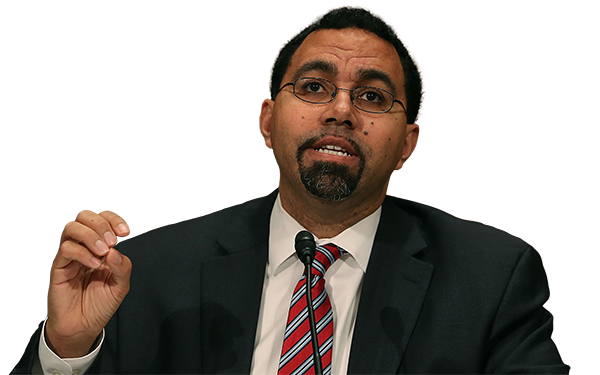In Senate Confirmation, King Talks ESSA, Charters, College Loans and Federal Restraint

John B. King, Jr., the presumptive new U.S. Secretary of Education, was peppered Thursday with questions from senators on everything from college affordability, student data security, charter schools, challenges in rural education and refining regulations for students with disabilities.
The two-hour hearing before the Senate Health, Education, Labor and Pensions Committee (HELP) was one major step on the way to King’s anticipated confirmation as Arne Duncan’s successor next month.
King has served as acting secretary since Duncan’s departure late last year, and joined the department as an advisor after a tumultuous tenure as New York state education commissioner in December 2014. Several senators welcomed King warmly and noted they intend to support his nomination when the committee votes March 9.
Sen. Patty Murray, the committee’s senior Democrat, commented that while his tenure will last for less than a year, there’s “still plenty of time to make progress in several key areas.”
If he is confirmed, King will have till the end of 2016 to tackle those big issues as well as the most pressing task facing the Department of Education: implementing the Every Student Succeeds Act, which dramatically shifts power from the federal level to the states. (The 74: Fault Lines Emerge on Putting New Federal Education Law into Practice)
King, during his time in New York, championed many of the policies that drove widespread opposition to a strong federal role in education, including the Common Core, standardized testing and tying teacher evaluations more closely to student performance.
Sen. Lamar Alexander, committee chairman and the chief architect of ESSA, repeatedly emphasized the limited role of the education department in determining school accountability plans and teacher evaluations under the new K-12 law. He seemed determined to get King’s explicit promise that, as secretary, he would respect those limits.
King’s response, in sum and substance: Absolutely.
King indicated that he agreed with Alexander that ESSA should be implemented in time for the 2017-18 school year.
Earlier in the day, King was pressed in similar fashion by members of the House Committee on Education and Workforce. In that hearing, King said ESSA provides a “tremendous opportunity” for state and local school officials to broaden their influence and tailor their own policies to teachers’ and students’ needs.
“As we develop guidance and regulations, we will take input very seriously from all stakeholders … and ensure state and local flexibility within the guardrails of protecting students’ civil rights,” King said.
At the Senate hearing Thursday afternoon, King assured a few skeptical Republicans, including Sen. Pat Roberts of Kansas, that the department would steer clear of offering states incentives to adopt any particular curriculum, a la Common Core, as required under the new law.
Senators also pressed him on college affordability and student loan relief. Sen. Elizabeth Warren in particular urged him to quickly act to help student borrowers who’ve been victims of “bad actors” in the loan industry. King promised he was committed to finding them recourse.
King, who helped found a charter school in Boston and ran a charter management group in New York, said as secretary he would work to support more high-quality charters while holding charter school authorizers to task when they do not serve students well. (The 74: Four Things to Know about John King, the Next Education Secretary)
As states move forward with ESSA and think about interventions they’ll put in place in high-needs schools, King said, “growing the number of innovative high-needs schools, whether that’s innovative district schools or innovative charter schools, should be a part of that discussion.”
In response to a question from Republican Sen. Lisa Murkowski of Alaska about how to address the challenges faced by rural school districts, King pointed to his work, as state education commissioner, in smaller, geographically isolated areas of upstate New York.
He was also offered some stark advice.
Senator Sheldon Whitehouse, Democrat of Rhode Island, said King would be wise to understand that what educators need and want is “resources, not restrictions,” particularly after the “federal oversight apparatus” of recent years.
“Sometimes the course of wisdom is to get out of the way,” Whitehouse said. “And I think that if you can do that, be there when we need you and be out of the way when the schools are trying as hard as they can to get it right, I think that will make a very big difference in our schools.”
Throughout the hearing, King seemed to acknowledge that sentiment, and stressed his intention to work collaboratively. And he used noticeably softer rhetoric than he was known for during his time in New York, when he clashed repeatedly with teachers’ unions, parents and and superintendents during the state’s flawed rollout of the Common Core standards and an overhaul of the teacher evaluation system.
In response, the state teachers union called for his resignation, and when he left for D.C. in December 2014, American Federation of Teachers President Randi Weingarten was quick to express the union’s disappointment, calling him a polarizing figure.
Meanwhile, for those worried that ESSA may have ceded too much power to the states — particularly those without strong track records serving low-income, minority, disabled and ELL students — King’s reputation for stressing accountability has been welcomed.
“As a former teacher, principal and state commissioner, I know from personal experience that the best ideas come from classrooms, not from conference rooms,” King told the Senate panel. “The new (ESSA) law creates a renewed opportunity to focus on equity and new freedom for state and local leaders to establish better, more balanced ways of assessing student learning. Together I hope we can harness the bipartisan momentum of its passage to transform career and technical education and to advance college access, affordability and completion.”
As his wife and two daughters, who attend Maryland public schools, sat nearby, King told the panel of his upbringing in Brooklyn as the son of two lifelong public school teachers who died before he graduated from high school. Touching on a familiar personal theme, he explained how as a young man, school was a place of refuge and teachers saved his life. These personal experiences have shaped his perspective on the role of education in today’s students, who might be just like him, King said.
When Murray, the ranking Democrat, asked about solutions to teacher shortages, King said low pay and the rapid growth of populations of hard-to-serve students, including English Language Learners, in certain states must be addressed.
And, in perhaps another nod to lessons learned the hard way in New York, King added that a broader problem nationwide is “a tone in the conversation around educators in the last decade that’s at times left teachers and principals feeling attacked or blamed for the challenges that we have as a society.”
ESSA is an opportunity to “reset” that conversation and build on the bipartisan momentum that ushered in passage of the new law, he said.
“We have urgent work to do. But I believe we stand well-positioned for that work in part thanks to the Every Student Succeeds Act,” he told the panel. “The new law preserves the critical federal role to ensure guardrails to protect civil rights, but the locus of decision-making is rightly shifting back to states and districts and away from the one-size-fits-all mandates of No Child Left Behind.”
Get stories like these delivered straight to your inbox. Sign up for The 74 Newsletter

;)
